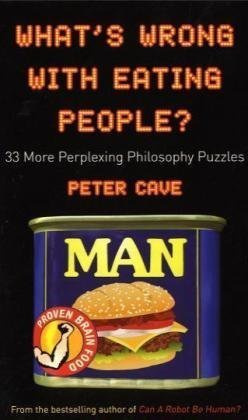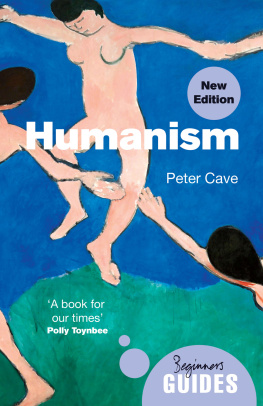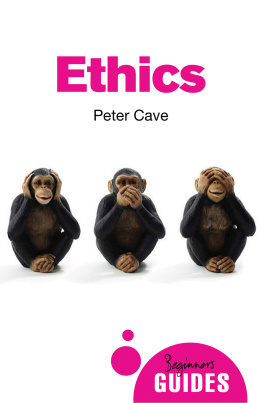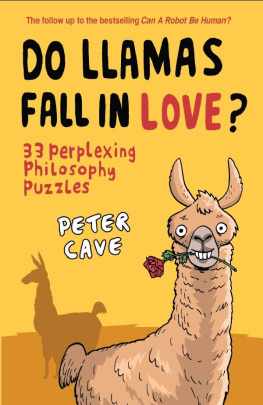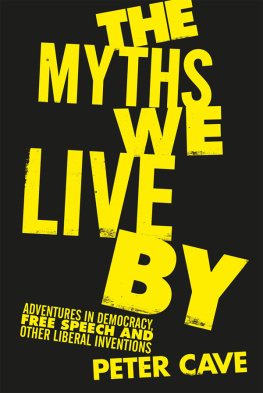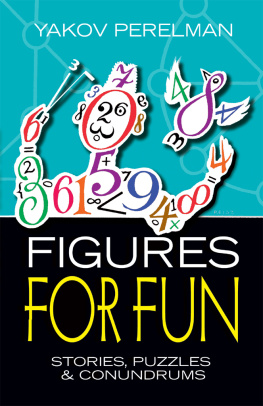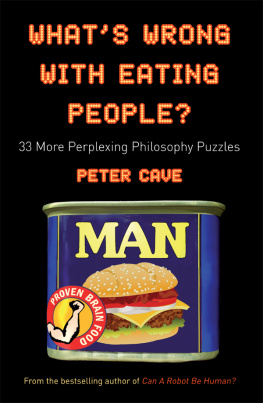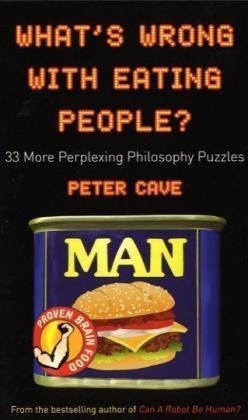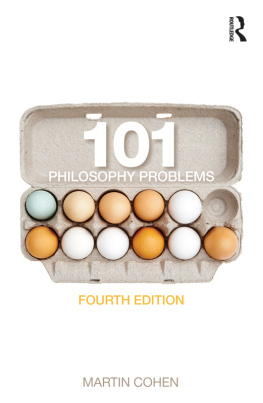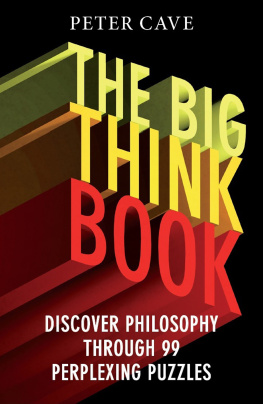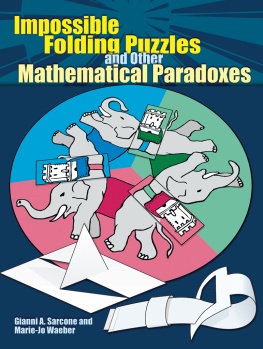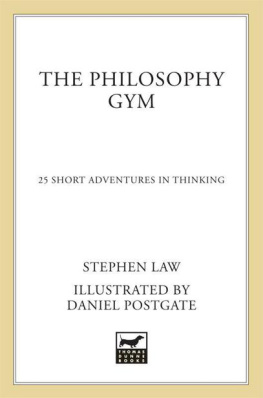What's Wrong with Eating People?
Stephen Law, Author of The Philosophy Gym
Cave is not just a very gifted philosopher, he's also clear, captivating and funny too.
Your personal philosophy trainer. The puzzles offer you a heady work out, leaving you fitter to fight your own intellectual corner.
Mark Vernon, Author of 42: Deep Thought on Life, the Universe and Everything
Delightfully written and fun to read. Witty and eloquent and the puzzles are explored throughout with both common sense and wisdom.
Anthony Ellis, Professor of Philosophy, Virginia Commonwealth University
Energetic, highly entertaining, and delightfully thought- provoking.
A. W.Moore, Professor ofPhilosophy, University ofOxford
Provocative and lively. Few would fail to be stimulated by these puzzles.
Oliver Leaman, Professor ofPhilosophy, University ofKentucky
About the Author
Writer and broadcaster Peter Cave teaches philosophy for The Open University and City University London. Author of the bestselling Can A Robot be Human'?, he chairs the Humanist Philosophers' Group and is often in debate, talking about paradoxes, and arguing for good reasoning, especially in ethical, political, and religious life. He frequently contributes to philosophy journals and magazines, from the academic to the popular, lectures abroad, and introduced BBC radio listeners to a paradoxical fair of fun. Philosophy and reflection, he feels, are often helped when enlivened with tales, images, and a few touches of humour.
What's Wrong with Eating People?
33 More Perplexing Philosophy Puzzles Peter Cave
ONBWORLD
O X I O R 1)
A Oneworld Book
Published by Oneworld Publications 2009
Copyright Peter Cave 2009
All rights reserved Copyright under Berne Convention A CIP record for this title is available from the British Library
Typeset by Jayvee, Trivandrum, India Illustrations by www.fordcartoon.com Cover design by James Nunn Printed and bound in Great Britain by XXX
Oneworld Publications 185 Banbury Road
Oxford OX2 7AR England
www.oneworld-publications.com
NL08
Learn more about Oneworld. Join our mailing list to find out about our latest titles and special offers at:
www.oneworld-publications.com
For:
those who wonder - and those who do not - andArdon Lyon (again)
CONTENTS
'My beloved is mine' or 'The trouble with football is
the other team' 102
What's wrong with eating people? or even
Who's for dinner? 123
Appendix 1 Further reading 221
General Index 245
PREFACE
Time would have passed anyway.
There is nothing that you need to know to enjoy this book. Well, I exaggerate - but only a little. Are you able to read English? - an interesting question. After all, even though we have probably never met, you know and I know that the answer is 'yes'. That hurdle is already jumped; you have read this far. There are also the hurdles of being able and willing to think. These too are jumped; reading requires both - and you are still reading so far.
Reading is an amazing activity. Look at any sentence in a language that you know. It is exceedingly difficult to see it solely as a set of printed shapes. You cannot help but see the shapes as words; you cannot help but see through to some meaning. Yet whatever is this thing called 'meaning? Already we are beginning to philosophize - and when, in our daily lives, we praise people, fall in love or wonder what it is rational to do, lurking within are philosophical positions about how free people are, about desires, choices, and reasoning.
Virtually every discussion, argument, reflection we have - be it in the pub, newspaper or bath - embodies some philosophical assumptions and questions. Here, I bring some to light, sometimes playfully, sometimes provocatively, be it through phantasies, dialogues or straight reports. Of course, 'enjoyment' in dipping may not be the right expression; but I am sure that the discussions are sufficiently intriguing for you to muse upon further and probably with others. I am sure because, as humans, we possess a reflective and social curiosity. And that curiosity is not just a way of passing the time. Indeed, as has been said, time would have passed anyway. The curiosity is about human life and our understanding of the world - including, for that matter, our understanding of time.
The puzzles, paradoxes, and perplexities presented here range across the gamut of human life, and - despite the subtitle - far exceed thirty-three. Some directly concern rationality and reasoning, logic and language; but many spread way beyond, into ethics, the arts, mind, and law - into, indeed, whether eating people is wrong. They transport us from how great God may be to whether women and men are equal; from why we should save endangered species to muddles in reasoning - to what is this thing called 'love'?
Philosophy opens eyes; philosophy opens 'I's
Simply by virtue of belonging to a community of speakers, we possess materials for philosophizing. There need be no special demands for mathematical ability, erudite historical knowledge or scientific investigations - just our everyday experiences. In a way, philosophy is neither as difficult as Sudoku nor as annoyingly cryptic as some crosswords. Yet, in another way, philosophy presents hugely greater challenges and rewards - not least because we may never be sure when we have finished. The puzzles may persist; perhaps some are inescapable. Of course, philosophy is no mere matter of fun; philosophy grapples with basic understandings and misunderstandings.
Philosophy knows no bounds. Philosophers will puzzle about anything. They will puzzle - yet also aim to clarify. Well, that is how many philosophers see their task. This may challenge some recent 'postmodernists' who often appear to value obscurity. I have in mind the excesses of Derrida, Irigaray, and Kristeva - but perhaps the problem is mine, in failing to comprehend. Of course, the puzzles in this book give rise to many perplexities; but I hope they do not result from the writing's obscurity. The perplexities are present at a much deeper level - when we are reflecting on the world, humanity, and, yes, reflecting on language and reflecting on reflecting.
Philosophy opens eyes. Seneca of ancient Rome commented how things of daily occurrence, even when most worthy of amazement and admiration, pass us by unnoticed. We may be likened, on occasions, to sleepwalkers, successfully finding our way about, yet unaware of what we are doing. Philosophy opens our eyes indeed. Philosophy, it has been suggested, opens our eyes to what we already know - itself a paradoxical thought.
Philosophy also opens 'I s. Once in worldly reflection, we may soon be wondering about ourselves - or, better, our and others' selves.We use the word 'I' thousands of times each day, yet quite what is the self, or the selves, of which we speak? What makes my self a different self from yours? - puzzles found in Chapters 18 and 6, Thebrain and 'Hi, I'm Sirlsaac Newton - don't mention the apples'.
Brain food - or philosophy through puzzles
Philosophy can generate light - unlike treadmills at gyms. Although ungymed myself, I recognize that exercising the body is popular and valuable. However, we also need some exercising of the mind. Philosophy provides the opportunity - and provides the opportunity about matters that matter. Philosophy does not just help to keep our minds active and alert; it involves us, as said, in some of humanity's deepest questions. It may even generate some welcome humility: must all puzzles have solutions?

